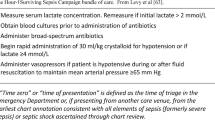Abstract
Purpose
Numerous studies on the volume-outcome relationships in rectal cancer surgery have assessed surgical mortality. However, little is known about the association between hospital/surgeon volumes and postoperative complications, including anastomotic leakage and infection, following rectal cancer surgery.
Methods
Using a web-based patient registration system, data were collected on inpatients who underwent rectal cancer surgery between November 1, 2006 and February 28, 2007 in Japan. Using multivariate analyses, intraoperative blood loss, postoperative complications and length of stay were independently compared against the provider volumes and covariates.
Results
No significant association was identified between the blood loss and hospital volume, while surgeons with the highest volume (≥500 procedures) were likely to demonstrate a reduced blood loss (odds ratio, 0.67; 95% confidence interval, 0.46–0.99; P = 0.043). No significant relationship was found between the incidence of postoperative complications and the provider volume. A higher hospital volume significantly decreased the length of stay (hazard ratio, 1.41; 95% confidence interval, 1.23–1.62; P < 0.01), but the surgeon volume was not associated with the length of hospital stay.
Conclusion
The present study did not find any significant relationship between the volume and postoperative complications. These results do not support the effectiveness of regionalizing rectal cancer surgery to high-volume centers, at least in the Japanese clinical setting.
Similar content being viewed by others
References
Birkmeyer JD, Siewers AE, Finlayson EV, Stukel TA, Lucas FL, Batista I, et al. Hospital volume and surgical mortality in the United States. N Engl J Med 2002;346:1128–1137.
Hannan EL, Radzyner M, Rubin D, Dougherty J, Brennan MF. The influence of hospital and surgeon volume on in-patient mortality for colectomy, gastrectomy, and lung lobectomy in patients with cancer. Surgery 2002;131:6–15.
Schrag D, Panageas KS, Riedel E, Hsieh L, Bach PB, Guillem JG, et al. Surgeon volume compared with hospital volume as a predictor of outcome following primary colon cancer resection. J Surg Oncol 2003;83:68–78.
Ko CY, Chang JT, Chaudhry S, Kominski G. Are high-volume surgeons and hospitals the most important predictors of inhospital outcome for colon cancer resection? Surgery 2002;132:268–273.
Schrag D, Panageas KS, Riedel E, Cramer LD, Guillem JG, Bach PB, et al. Hospital and surgeon procedure volume as predictors of outcome following rectal cancer resection. Ann Surg 2002;236:583–592.
Harmon JW, Tang DG, Gordon TA, Bowman HM, Choti MA, Kaufman HS, et al. Hospital volume can serve as a surrogate for surgeon volume for achieving excellent outcomes in colorectal resection. Ann Surg 1999;230:404–411.
Schrag D, Cramer LD, Bach PB, Cohen AM, Warren JL, Begg CB. Influence of hospital procedure volume on outcomes following surgery for colon cancer. JAMA 2000;284:3028–3035.
Hodgson DC, Zhang W, Zaslavsky AM, Fuchs CS, Wright WE, Ayanian JZ. Relation of hospital volume to colostomy rates and survival for patients with rectal cancer. J Natl Cancer Inst 2003;95:708–716.
Urbach DR, Bell CM, Austin PC. Differences in operative mortality between high- and low-volume hospitals in Ontario for 5 major surgical procedures: estimating the number of lives potentially saved through regionalization. CMAJ 2003;168:1409–1414.
Parry JM, Collins S, Mathers J, Scott NA, Woodman CB. Influence of volume of work on the outcome of treatment for patients with colorectal cancer. Br J Surg 1999;86:475–481.
Simunovic M, To T, Baxter N, Balshem A, Ross E, Cohen Z, et al. Hospital procedure volume and teaching status do not influence treatment and outcome measures of rectal cancer surgery in a large general population. J Gastrointest Surg 2000;4:324–330.
Meyerhardt JA, Tepper JE, Niedzwiecki D, Hollis DR, Schrag D, Ayanian JZ, et al. Impact of hospital procedure volume on surgical operation and long-term outcomes in high-risk curatively resected rectal cancer: findings from the Intergroup 0114 Study. J Clin Oncol 2004;22:166–174.
Rabeneck L, Davila JA, Thompson M, El-Serag HB. Surgical volume and long-term survival following surgery for colorectal cancer in the Veterans Affairs Health-Care System. Am J Gastroenterol 2004;99:668–675.
Meyerhardt JA, Catalano PJ, Schrag D, Ayanian JZ, Haller DG, Mayer RJ, et al. Association of hospital procedure volume and outcomes in patients with colon cancer at high risk for recurrence. Ann Intern Med 2003;139:649–657.
McArdle CS, Hole DJ. Influence of volume and specialization on survival following surgery for colorectal cancer. Br J Surg 2004;91:610–617.
Kee F, Wilson RH, Harper C, Patterson CC, McCallion K, Houston RF, et al. Influence of hospital and clinician workload on survival from colorectal cancer: cohort study. BMJ 1999;318:1381–1385.
Miyakura Y, Togashi K, Konishi F, Horie H, Saitoh K, Kojima M, et al. Appropriate operation for elderly colorectal cancer patients based upon an assessment of preoperative risk factors. Surg Today 2003;33:498–503.
Yamamoto S, Fujita S, Ishiguro S, Akasu T, Moriya Y. Wound infection after a laparoscopic resection for colorectal cancer. Surg Today 2008;38:597–602.
Diggle PJ, Heagerty P, Liang KY, Zeger SL. Analysis of longitudinal data. 2nd ed. Oxford: Oxford University Press; 2001.
Author information
Authors and Affiliations
Consortia
Rights and permissions
About this article
Cite this article
Yasunaga, H., Matsuyama, Y., Ohe, K. et al. Volume-outcome relationship in rectal cancer surgery: A new perspective. Surg Today 39, 663–668 (2009). https://doi.org/10.1007/s00595-008-3848-x
Received:
Accepted:
Published:
Issue Date:
DOI: https://doi.org/10.1007/s00595-008-3848-x




